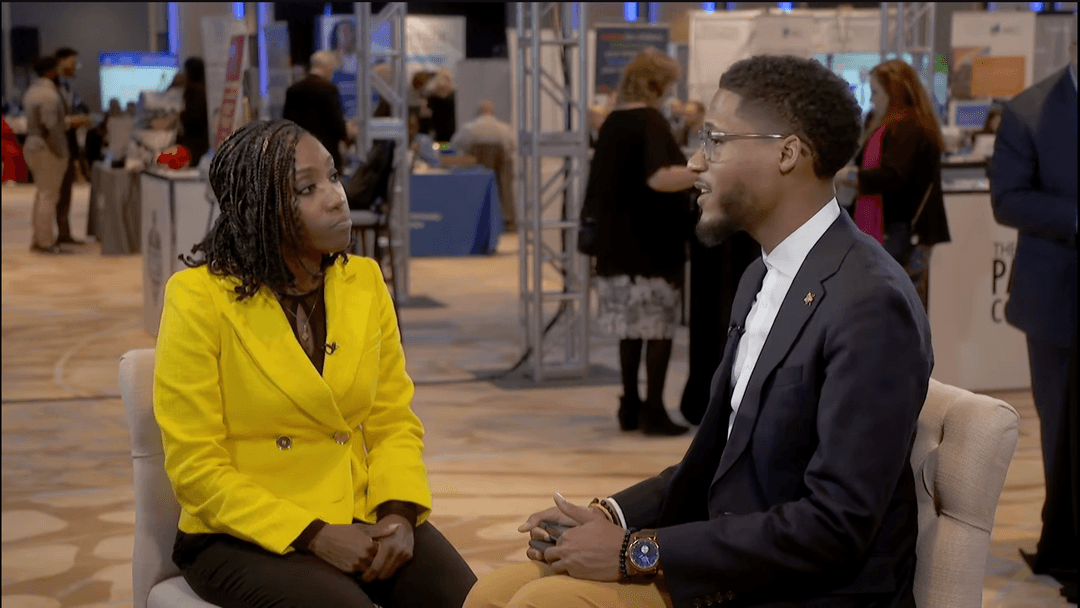Keeping Commitments? The State of Diversity, Equity, Inclusion Efforts in the Workplace
Aug 4, 2022
It has been more than two years since George Floyd’s murder sparked huge commitments from businesses and organizations to expand their diversity, equity and inclusion efforts in the workplace. Promises were made, but were they kept? American Black Journal takes a look at whether DEI efforts in the workplace have improved since calls for racial and social justice re-ignited across the nation.
RELATED: Have Diversity, Equity and Inclusion Progressed in the Workplace?
RELATED:Watch American Black Journal’s workforce diversity roundtable here
“American Black Journal” host Stephen Henderson sits down with The LEE Group President Mark S. Lee and Nikki Pardo, from Global Alliance Solutions, for a candid conversation on the state of DEI efforts in the workplace at corporations across America and the status of new Chief Diversity Officer positions that were created. Plus, Henderson examines the amount of resources that have been allocated to DEI efforts and how they compare to the commitments made two years prior.
Full Transcript:
Stephen Henderson, Host, American Black Journal: So Mark, I’m going to start with you. We’ve had this conversation a couple of times, right? Right after the murder of George Floyd and the protests. You had these corporations come out and say, hey, we get it. We got to do better. We need to focus on equity, diversity and inclusion. We talked about a year ago, I think, about where we were. We still, I think, have some frustrations about what the response, the actual response has been by these corporations. They’ve said they want to do a lot, but brick and mortar, there isn’t as much as we might expect.
Mark S. Lee, President & CEO, The Lee Group: I think that’s a very accurate statement. Let’s just circle back, two years ago, if we could for a quick moment. Obviously, after the George Floyd situation, we saw a huge increase in commitment statements, and people were making that verbal commitment, if you will, to hiring DEI professionals at that point in time.
As fast forward to today and it’s very mixed results. It’s actually somewhat frustrating in terms of the progress to date. Let me just give you a specific data point here. Recently, a survey was done by the Creative Investment Research of the 271 U.S. companies or corporations that made DEI pledges. Now financially since that racial injustice, if we were a couple of years ago, since the summer of 2020, these corporations estimated to pledge some $67 billion.
Estimated to pledge $67 billion behind the DEI. To the beginning of this year, only $652 million have actually been spent. That’s less than 1% percent. As part of the frustration that we’re seeing, there was a lot of gung-ho excitement and commitment to it, but when you put the dollars to the battle, so to speak, those dollars are not coming through.
Stephen Henderson: Nikki, one of the things that’s also happening is that people are finding themselves in these roles in corporations and finding that maybe they’re not all that they’re chalked up to be and they’re leaving. Talk about some of the frustrations that are associated with just the idea of introducing these positions and these ideas into a corporate space that, let’s be honest, is just not used to it.
Nikki Pardo, President, Global Alliance Solutions: Yeah, that’s a great question. So, I belong to two large nationally, national organizations. It’s kind of an informal group of DEI practitioners and I also facilitate, one myself. And Mark has spoken twice and that he was hit and you know, because he will give it to you. He comes with that data and he gives it to you raw. You know the stats.
But I’ll tell you what’s happening now is we saw the trend, the bandwagon post-May 25th, 2020, when the world stopped spinning on its axis for 10 minutes. And so these businesses, these organizations across all industries were clamoring and with these chief diversity officers, CDO positions. And so now we revisit it. Here we are two years later. And the feedback from my fellow practitioners in these groups is they are very frustrated and I’m not going to use an absolute and say, oh. Some have made tremendous strides and really moved that needle. But others are really frustrated and feel that they were set up to fail, where they have no budgets. So that means no professional development.
And everyone knows that this industry, I’ve been in it now collectively for 17 years, that is one of the fastest evolving industries. So you have to keep up with trends. So that means you have to get certifications or join organizations, and with like-minded. So yeah, that’s where they are right now. And in the beginning, I remember when I was having conversations with them, I’m like, why the dashes and the slashes? It would be CDOs slash talent acquisition, slash, account manager. I remember just getting, not angry, but just I was questioning it.
Now they’re grateful for it because now that the whole wave has kind of calmed down, they’re able to return back to their TA positions or their accounting positions or their marketing positions or whatever it was. And I always said in the beginning, like I called it the tap on the shoulder. Like if you were Black, if you were a woman, especially a middle-aged woman, and expressed an interest, it’s like, hey, you’re already a CDO, and we saw that. And Mark, you could testify to this also because you have friends who this is also happened to. So now that the wave has kind of stopped and they’re going to their respective corners and that’s the way the trend is going.
Stephen Henderson: Yeah, I mean, that’s really disappointing. Mark, is this about a commitment that was harder to fulfill than these corporations thought it would be? Or is this about I guess a head fake of sorts that they said they were interested and turned out they weren’t as interested?
Mark S. Lee: I think this is an issue with people overly excited that put that in quotes, meaning that we have to do something, we have to do something, we have to do something without properly planning for it. And it was almost a knee-jerk reaction to what happened in May of ’20. And what Nikki is saying is spot on.
A lot of people that were brought into these organizations and I’m just generalizing right now. Okay, just generalizing. Some people, quite candidly, were not prepared to take these positions. And so what the organizations were doing, there was a knee-jerk reaction. It brought them in. And then when the people came in to Nikki’s point, there was a lot of frustration. The average tenure of a person coming into it has declined from 3.1 years in that position to 1.8 years in less than a two-year window. So think about that. So the bottom line was a knee-jerk reaction, I think, as a result that there was not in proper planning. And what we’re seeing right now is a direct result of not having appropriate plans and resources in place.
Stephen Henderson: Yeah. One of the things that I think is really key to the success of people in these roles, of course, is the senior management environment at these corporations. Right. And in a lot of cases, you still got senior management that doesn’t reflect the general population. There aren’t enough women. There aren’t enough people of color. Nikki, I wonder if you can talk about maybe the distinction between places that have done better with overall diversity and then introduced this idea of the DEI officer and places that still, I guess, are struggling with that concept or just not really embracing it. It seems to me that the likelihood of success is, at least in part, dependent on how diverse the workplace that you’re getting into is in its senior management.
Nikki Pardo: Yeah. There’s so much research out there to support this, McKinsey report. I mean, all of that. And but I just want to say, I just want to kind of dial back a little bit where I think things look different now, if that makes sense. And like, if you go on Indeed or any other LinkedIn or any of the platforms where the CDO positions that are embedded in the C-suite, they are kind of brought down a tier.
Where they might not necessarily be in the C-suite or the S-suite or the V-suite, but that next tier is like a directorship or… But I always say, if you are, if you bringing down those tiers, make sure that they have are a direct liaison to the S and V suit. So yeah, so it just is looking a little different. I’ll say that.
And also I’ll say too, in the industry slight defense, now companies are trying to wrangle in this remote work, so everything has shifted to that. Where now employees are I mean, I’m sorry, employers and companies are like, okay, we’re bringing everyone back and now they’re losing people. So it’s just this whole. So I think it’s shifted to that. Again, I’m not defending. I am defending, but I’m not defending the industry. But, yeah, it’s just and Mark, I don’t know if you can.
Mark S. Lee: Let me just chime in for a second, because all of this is a direct result of a lot of factors, very briefly. And what we’re seeing here in terms of not the lack of connectivity from the senior management dollar. In some cases that employees are beginning to feel alienated. And so even the word DEI. If you use the word diversity inside of an organization, you have some employees who are becoming offended by that word and because they don’t have… They feel as though that the organization is not necessarily embraced it. They may have verbally embraced it, but has not been socially embraced throughout the entire organization.
So it becomes a challenge of how do you make the employees feel that it is important throughout the entire organization. But what’s happened with the last 18 months or so, it has some employees viewed as a divisive strategy and divided people inside the organization, and that’s another challenge that needs to be dealt with as well.
Nikki Pardo: Yeah. And to kind of piggyback what Mark is saying and what I’m seeing Stephen now is the employees are flipping it and holding the ELT teams and senior leadership accountable and calling them out, as we see on all these different platforms. Where they’re being very vocal and especially, I’m pro millennials, I don’t want it to seem like I’m an anti, but they’re really driving this narrative.
You made all these declarations, two years ago, Black people, we love you. We stand with you, we stand by you. And some of these friends that I know personally, were given promises and okay, listen, we are going to sponsor you. We’re done with mentorship. We’re going to sponsor you. We’re going to pour all these resources into you and to prepare you for that next jump that they did not receive.
Stephen Henderson: Yeah. I want to talk just briefly about local and southeast Michigan. I know, Mark, you work with a lot of local companies. And Nikki, I know you do, too. Are we seeing something different here? Something better? Maybe is maybe my hopeful, hopeful statement there or are we struggling as much as everybody else? Mark.
Mark S. Lee: Thank you. I think from my perspective, I am working very heavily in this space. I’m seeing people are truly not just saying it verbally. They’re trying to make a change inside the organization. So I’m sure that outside of that spirit of maybe some other organizations are grappling with this discussion as we’re having this warning. But by the same token, I think the people I’m working with, they get it. They’re trying to make a change. We’ve still got a long way to go.
Stephen Henderson: And Nikki, what are you finding?
Nikki Pardo: I’m seeing, like I said, it’s slowed down a little bit and it looks different. And I have more, I have clients literally from coast to coast.
Stephen Henderson: Everywhere, right?
Nikki Pardo: Yeah. Yeah. And I’m seeing that there are some industries more than others that are sustaining their commitment. But then, like I said, now things have kind of shifted back to figuring out how they’re going to manage all of the remote and stop the bleeding from employees with the great resignation they’re dealing with as well. So it’s a lot of different variables, but I’ll say the momentum’s there, it’s just lessened.
Stephen Henderson: Yeah. Okay. All right. Mark Lee and Nikki Pardo, good to have two better voices to talk about this issue. Thanks so much for joining us on American Black Journal.
Nikki Pardo: Thank you very much.
Mark S. Lee: Appreciate it.
Stay Connected:
Subscribe to Detroit PBS YouTube Channel & Don’t miss American Black Journal on Tuesday at 7:30 p.m and Sunday at 9:30 a.m. on Detroit PBS, WTVS-Channel 56.
Catch the daily conversations on our website, Facebook, Twitter and Instagram @amblackjournal.
View Past Episodes >
Watch American Black Journal on Tuesday at 7:30 p.m. and Sunday at 9:30 a.m. on Detroit Public TV, WTVS-Channel 56.
Stay Connected
Subscribe to Detroit PBS YouTube Channel & Don’t miss American Black Journal on Tuesday at 7:30 p.m. and Sunday at 9:30 a.m. on Detroit PBS, WTVS-Channel 56.
Catch the daily conversations on our website, Facebook, Twitter, and Instagram @amblackjournal.
Related Posts
Leave a Reply
Your email address will not be published. Required fields are marked*




























